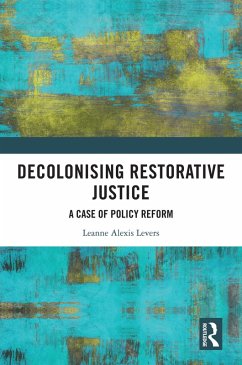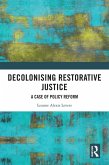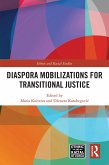41,95 €
41,95 €
inkl. MwSt.
Sofort per Download lieferbar

21 °P sammeln
41,95 €
Als Download kaufen

41,95 €
inkl. MwSt.
Sofort per Download lieferbar

21 °P sammeln
Jetzt verschenken
Alle Infos zum eBook verschenken
41,95 €
inkl. MwSt.
Sofort per Download lieferbar
Alle Infos zum eBook verschenken

21 °P sammeln
- Format: ePub
- Merkliste
- Auf die Merkliste
- Bewerten Bewerten
- Teilen
- Produkt teilen
- Produkterinnerung
- Produkterinnerung

Bitte loggen Sie sich zunächst in Ihr Kundenkonto ein oder registrieren Sie sich bei
bücher.de, um das eBook-Abo tolino select nutzen zu können.
Hier können Sie sich einloggen
Hier können Sie sich einloggen
Sie sind bereits eingeloggt. Klicken Sie auf 2. tolino select Abo, um fortzufahren.

Bitte loggen Sie sich zunächst in Ihr Kundenkonto ein oder registrieren Sie sich bei bücher.de, um das eBook-Abo tolino select nutzen zu können.
This book critically examines the colonial dimensions of restorative justice through the lens of justice policy reform in Jamaica.
- Geräte: eReader
- mit Kopierschutz
- eBook Hilfe
Andere Kunden interessierten sich auch für
![Decolonising Restorative Justice (eBook, PDF) Decolonising Restorative Justice (eBook, PDF)]() Leanne Alexis LeversDecolonising Restorative Justice (eBook, PDF)41,95 €
Leanne Alexis LeversDecolonising Restorative Justice (eBook, PDF)41,95 €![The Routledge International Handbook on Decolonizing Justice (eBook, ePUB) The Routledge International Handbook on Decolonizing Justice (eBook, ePUB)]() The Routledge International Handbook on Decolonizing Justice (eBook, ePUB)0,99 €
The Routledge International Handbook on Decolonizing Justice (eBook, ePUB)0,99 €![The American Prison Business (eBook, ePUB) The American Prison Business (eBook, ePUB)]() Jessica MitfordThe American Prison Business (eBook, ePUB)34,95 €
Jessica MitfordThe American Prison Business (eBook, ePUB)34,95 €![Diaspora Mobilizations for Transitional Justice (eBook, ePUB) Diaspora Mobilizations for Transitional Justice (eBook, ePUB)]() Diaspora Mobilizations for Transitional Justice (eBook, ePUB)41,95 €
Diaspora Mobilizations for Transitional Justice (eBook, ePUB)41,95 €![Queer Necropolitics (eBook, ePUB) Queer Necropolitics (eBook, ePUB)]() Queer Necropolitics (eBook, ePUB)55,95 €
Queer Necropolitics (eBook, ePUB)55,95 €![Men, Masculinities and Honour-Based Abuse (eBook, ePUB) Men, Masculinities and Honour-Based Abuse (eBook, ePUB)]() Men, Masculinities and Honour-Based Abuse (eBook, ePUB)41,95 €
Men, Masculinities and Honour-Based Abuse (eBook, ePUB)41,95 €![Queer Necropolitics (eBook, PDF) Queer Necropolitics (eBook, PDF)]() Queer Necropolitics (eBook, PDF)55,95 €
Queer Necropolitics (eBook, PDF)55,95 €-
-
-
This book critically examines the colonial dimensions of restorative justice through the lens of justice policy reform in Jamaica.
Dieser Download kann aus rechtlichen Gründen nur mit Rechnungsadresse in A, B, BG, CY, CZ, D, DK, EW, E, FIN, F, GR, HR, H, IRL, I, LT, L, LR, M, NL, PL, P, R, S, SLO, SK ausgeliefert werden.
Produktdetails
- Produktdetails
- Verlag: Taylor & Francis
- Seitenzahl: 202
- Erscheinungstermin: 1. September 2023
- Englisch
- ISBN-13: 9781000936278
- Artikelnr.: 68414277
- Verlag: Taylor & Francis
- Seitenzahl: 202
- Erscheinungstermin: 1. September 2023
- Englisch
- ISBN-13: 9781000936278
- Artikelnr.: 68414277
- Herstellerkennzeichnung Die Herstellerinformationen sind derzeit nicht verfügbar.
Leanne Alexis Levers is a political scientist who works as a strategic advocacy, communications, and policy consultant, having in-depth knowledge of justice reform, global health, gender equality and racial justice. She is also the co-founder of Dope Black Women CIC, an award-winning global platform dedicating to the empowerment of Black women.
Foreword by Dr. Anthony Harriott ix
Foreword by Dr. Lloyd Barnett, OJ, PhD, LLD (Hon) xi
Acknowledgements xiii
1 Decolonisation and Restorative Justice 1
What Is Restorative Justice? 4
Decolonisation 6
Research Questions 13
Contributions 13
Chapter Summaries 16
Notes 18
References 20
2 Policy Transfer as a Tool of Decolonisation in the Caribbean 27
Dolowitz and Marsh Framework 32
Who Is Involved in Policy Transfer? 32
What Is the Motivation to Engage in Policy Transfer? 34
What Is Being Transferred? 35
From Where Is Information Transferred? 35
What Is the Degree of Transfer? 35
What Enables or Constrains Policy Transfer? 35
How Do These Factors Affect the Success or Failure of Policy Transfer? 36
Globalisation and Policy Transfer as a Tool of Colonialism 38
Justice Policy in the Caribbean 40
Methodology 42
Case Study Approach 43
Triangulation 45
Limitations of the Study 46
Ethical Considerations 50
Privacy 50
Researcher Effect 53
Conclusion 54
Notes 55
References 56
3 Crime, Politics, and Justice in Jamaica 64
Jamaican Class Structure 65
Jamaican Politics 68
Political Structure 68
Political Party Competitiveness, Clientelism, and Violence 70
Garrisons 72
Dons 73
Homogeneous Voting 74
The Rise of the Don and Organised Crime 74
Clientelism Continued: Appeasing the Elite 76
Clientelism Continued: International Stakeholders and the
State 78
Donor Countries 78
IFIs 80
Jamaican Justice Policy 81
Consequences of Semi-Coercive Policy Transfer 82
A Shift Towards Opportunistic Policy Transfer 83
Conclusion 86
Notes 87
References 89
4 Decolonising Restorative Justice within a Jamaican Context 95
The Failure of the Formal Jamaican Justice System 95
Access to Justice 96
Bias and Corruption 97
Lack of Contextual Legislation 98
Inhumane Treatment of Prisoners 99
Dissatisfaction with the Justice System 99
Does RJ Work? 100
Retributive Aspects of RJ 100
Does RJ Work in Jamaica? 102
Is Decolonisation Possible? 102
Imagining Decolonised RJ in Jamaica 105
Decolonisation Framework 106
The Roots of RJ 106
Public Opinion 108
The Trunk of RJ 109
Civil Society 111
Other Non-State Actors 114
Dons and the Jungle Justice System 115
Maroons Justice System 117
The Branches of RJ 119
The Fruit of RJ 121
Conclusion 121
Notes 122
References 126
5 A History of Restorative Justice in Jamaica 134
History of Restorative Justice in Jamaica 134
RJ National Policy 134
Conclusion 149
Notes 149
References 151
6 Examining the Transfer of Restorative Justice Policy in Jamaica 153
Dolowitz and Marsh Policy Framework 153
Who Was Involved in Policy Transfer? 154
What Was the Motivation for Policy Transfer? 161
Where Was the Policy Transferred From? 163
What Was Transferred? 164
What Was the Degree of Transfer? 166
What Factors Constrained or Enabled Policy Transfer? 167
What Was the Impact of Policy Transfer? 169
Conclusion 169
Notes 172
References 173
Appendix One: Document Analysis 175
Appendix Two: Garrison Information 177
Appendix Three: Timeline 178
Index 184
Foreword by Dr. Anthony Harriott ix
Foreword by Dr. Lloyd Barnett, OJ, PhD, LLD (Hon) xi
Acknowledgements xiii
1 Decolonisation and Restorative Justice 1
What Is Restorative Justice? 4
Decolonisation 6
Research Questions 13
Contributions 13
Chapter Summaries 16
Notes 18
References 20
2 Policy Transfer as a Tool of Decolonisation in the Caribbean 27
Dolowitz and Marsh Framework 32
Who Is Involved in Policy Transfer? 32
What Is the Motivation to Engage in Policy Transfer? 34
What Is Being Transferred? 35
From Where Is Information Transferred? 35
What Is the Degree of Transfer? 35
What Enables or Constrains Policy Transfer? 35
How Do These Factors Affect the Success or Failure of Policy Transfer? 36
Globalisation and Policy Transfer as a Tool of Colonialism 38
Justice Policy in the Caribbean 40
Methodology 42
Case Study Approach 43
Triangulation 45
Limitations of the Study 46
Ethical Considerations 50
Privacy 50
Researcher Effect 53
Conclusion 54
Notes 55
References 56
3 Crime, Politics, and Justice in Jamaica 64
Jamaican Class Structure 65
Jamaican Politics 68
Political Structure 68
Political Party Competitiveness, Clientelism, and Violence 70
Garrisons 72
Dons 73
Homogeneous Voting 74
The Rise of the Don and Organised Crime 74
Clientelism Continued: Appeasing the Elite 76
Clientelism Continued: International Stakeholders and the
State 78
Donor Countries 78
IFIs 80
Jamaican Justice Policy 81
Consequences of Semi-Coercive Policy Transfer 82
A Shift Towards Opportunistic Policy Transfer 83
Conclusion 86
Notes 87
References 89
4 Decolonising Restorative Justice within a Jamaican Context 95
The Failure of the Formal Jamaican Justice System 95
Access to Justice 96
Bias and Corruption 97
Lack of Contextual Legislation 98
Inhumane Treatment of Prisoners 99
Dissatisfaction with the Justice System 99
Does RJ Work? 100
Retributive Aspects of RJ 100
Does RJ Work in Jamaica? 102
Is Decolonisation Possible? 102
Imagining Decolonised RJ in Jamaica 105
Decolonisation Framework 106
The Roots of RJ 106
Public Opinion 108
The Trunk of RJ 109
Civil Society 111
Other Non-State Actors 114
Dons and the Jungle Justice System 115
Maroons Justice System 117
The Branches of RJ 119
The Fruit of RJ 121
Conclusion 121
Notes 122
References 126
5 A History of Restorative Justice in Jamaica 134
History of Restorative Justice in Jamaica 134
RJ National Policy 134
Conclusion 149
Notes 149
References 151
6 Examining the Transfer of Restorative Justice Policy in Jamaica 153
Dolowitz and Marsh Policy Framework 153
Who Was Involved in Policy Transfer? 154
What Was the Motivation for Policy Transfer? 161
Where Was the Policy Transferred From? 163
What Was Transferred? 164
What Was the Degree of Transfer? 166
What Factors Constrained or Enabled Policy Transfer? 167
What Was the Impact of Policy Transfer? 169
Conclusion 169
Notes 172
References 173
Appendix One: Document Analysis 175
Appendix Two: Garrison Information 177
Appendix Three: Timeline 178
Index 184
Foreword by Dr. Lloyd Barnett, OJ, PhD, LLD (Hon) xi
Acknowledgements xiii
1 Decolonisation and Restorative Justice 1
What Is Restorative Justice? 4
Decolonisation 6
Research Questions 13
Contributions 13
Chapter Summaries 16
Notes 18
References 20
2 Policy Transfer as a Tool of Decolonisation in the Caribbean 27
Dolowitz and Marsh Framework 32
Who Is Involved in Policy Transfer? 32
What Is the Motivation to Engage in Policy Transfer? 34
What Is Being Transferred? 35
From Where Is Information Transferred? 35
What Is the Degree of Transfer? 35
What Enables or Constrains Policy Transfer? 35
How Do These Factors Affect the Success or Failure of Policy Transfer? 36
Globalisation and Policy Transfer as a Tool of Colonialism 38
Justice Policy in the Caribbean 40
Methodology 42
Case Study Approach 43
Triangulation 45
Limitations of the Study 46
Ethical Considerations 50
Privacy 50
Researcher Effect 53
Conclusion 54
Notes 55
References 56
3 Crime, Politics, and Justice in Jamaica 64
Jamaican Class Structure 65
Jamaican Politics 68
Political Structure 68
Political Party Competitiveness, Clientelism, and Violence 70
Garrisons 72
Dons 73
Homogeneous Voting 74
The Rise of the Don and Organised Crime 74
Clientelism Continued: Appeasing the Elite 76
Clientelism Continued: International Stakeholders and the
State 78
Donor Countries 78
IFIs 80
Jamaican Justice Policy 81
Consequences of Semi-Coercive Policy Transfer 82
A Shift Towards Opportunistic Policy Transfer 83
Conclusion 86
Notes 87
References 89
4 Decolonising Restorative Justice within a Jamaican Context 95
The Failure of the Formal Jamaican Justice System 95
Access to Justice 96
Bias and Corruption 97
Lack of Contextual Legislation 98
Inhumane Treatment of Prisoners 99
Dissatisfaction with the Justice System 99
Does RJ Work? 100
Retributive Aspects of RJ 100
Does RJ Work in Jamaica? 102
Is Decolonisation Possible? 102
Imagining Decolonised RJ in Jamaica 105
Decolonisation Framework 106
The Roots of RJ 106
Public Opinion 108
The Trunk of RJ 109
Civil Society 111
Other Non-State Actors 114
Dons and the Jungle Justice System 115
Maroons Justice System 117
The Branches of RJ 119
The Fruit of RJ 121
Conclusion 121
Notes 122
References 126
5 A History of Restorative Justice in Jamaica 134
History of Restorative Justice in Jamaica 134
RJ National Policy 134
Conclusion 149
Notes 149
References 151
6 Examining the Transfer of Restorative Justice Policy in Jamaica 153
Dolowitz and Marsh Policy Framework 153
Who Was Involved in Policy Transfer? 154
What Was the Motivation for Policy Transfer? 161
Where Was the Policy Transferred From? 163
What Was Transferred? 164
What Was the Degree of Transfer? 166
What Factors Constrained or Enabled Policy Transfer? 167
What Was the Impact of Policy Transfer? 169
Conclusion 169
Notes 172
References 173
Appendix One: Document Analysis 175
Appendix Two: Garrison Information 177
Appendix Three: Timeline 178
Index 184
Foreword by Dr. Anthony Harriott ix
Foreword by Dr. Lloyd Barnett, OJ, PhD, LLD (Hon) xi
Acknowledgements xiii
1 Decolonisation and Restorative Justice 1
What Is Restorative Justice? 4
Decolonisation 6
Research Questions 13
Contributions 13
Chapter Summaries 16
Notes 18
References 20
2 Policy Transfer as a Tool of Decolonisation in the Caribbean 27
Dolowitz and Marsh Framework 32
Who Is Involved in Policy Transfer? 32
What Is the Motivation to Engage in Policy Transfer? 34
What Is Being Transferred? 35
From Where Is Information Transferred? 35
What Is the Degree of Transfer? 35
What Enables or Constrains Policy Transfer? 35
How Do These Factors Affect the Success or Failure of Policy Transfer? 36
Globalisation and Policy Transfer as a Tool of Colonialism 38
Justice Policy in the Caribbean 40
Methodology 42
Case Study Approach 43
Triangulation 45
Limitations of the Study 46
Ethical Considerations 50
Privacy 50
Researcher Effect 53
Conclusion 54
Notes 55
References 56
3 Crime, Politics, and Justice in Jamaica 64
Jamaican Class Structure 65
Jamaican Politics 68
Political Structure 68
Political Party Competitiveness, Clientelism, and Violence 70
Garrisons 72
Dons 73
Homogeneous Voting 74
The Rise of the Don and Organised Crime 74
Clientelism Continued: Appeasing the Elite 76
Clientelism Continued: International Stakeholders and the
State 78
Donor Countries 78
IFIs 80
Jamaican Justice Policy 81
Consequences of Semi-Coercive Policy Transfer 82
A Shift Towards Opportunistic Policy Transfer 83
Conclusion 86
Notes 87
References 89
4 Decolonising Restorative Justice within a Jamaican Context 95
The Failure of the Formal Jamaican Justice System 95
Access to Justice 96
Bias and Corruption 97
Lack of Contextual Legislation 98
Inhumane Treatment of Prisoners 99
Dissatisfaction with the Justice System 99
Does RJ Work? 100
Retributive Aspects of RJ 100
Does RJ Work in Jamaica? 102
Is Decolonisation Possible? 102
Imagining Decolonised RJ in Jamaica 105
Decolonisation Framework 106
The Roots of RJ 106
Public Opinion 108
The Trunk of RJ 109
Civil Society 111
Other Non-State Actors 114
Dons and the Jungle Justice System 115
Maroons Justice System 117
The Branches of RJ 119
The Fruit of RJ 121
Conclusion 121
Notes 122
References 126
5 A History of Restorative Justice in Jamaica 134
History of Restorative Justice in Jamaica 134
RJ National Policy 134
Conclusion 149
Notes 149
References 151
6 Examining the Transfer of Restorative Justice Policy in Jamaica 153
Dolowitz and Marsh Policy Framework 153
Who Was Involved in Policy Transfer? 154
What Was the Motivation for Policy Transfer? 161
Where Was the Policy Transferred From? 163
What Was Transferred? 164
What Was the Degree of Transfer? 166
What Factors Constrained or Enabled Policy Transfer? 167
What Was the Impact of Policy Transfer? 169
Conclusion 169
Notes 172
References 173
Appendix One: Document Analysis 175
Appendix Two: Garrison Information 177
Appendix Three: Timeline 178
Index 184
Foreword by Dr. Anthony Harriott ix
Foreword by Dr. Lloyd Barnett, OJ, PhD, LLD (Hon) xi
Acknowledgements xiii
1 Decolonisation and Restorative Justice 1
What Is Restorative Justice? 4
Decolonisation 6
Research Questions 13
Contributions 13
Chapter Summaries 16
Notes 18
References 20
2 Policy Transfer as a Tool of Decolonisation in the Caribbean 27
Dolowitz and Marsh Framework 32
Who Is Involved in Policy Transfer? 32
What Is the Motivation to Engage in Policy Transfer? 34
What Is Being Transferred? 35
From Where Is Information Transferred? 35
What Is the Degree of Transfer? 35
What Enables or Constrains Policy Transfer? 35
How Do These Factors Affect the Success or Failure of Policy Transfer? 36
Globalisation and Policy Transfer as a Tool of Colonialism 38
Justice Policy in the Caribbean 40
Methodology 42
Case Study Approach 43
Triangulation 45
Limitations of the Study 46
Ethical Considerations 50
Privacy 50
Researcher Effect 53
Conclusion 54
Notes 55
References 56
3 Crime, Politics, and Justice in Jamaica 64
Jamaican Class Structure 65
Jamaican Politics 68
Political Structure 68
Political Party Competitiveness, Clientelism, and Violence 70
Garrisons 72
Dons 73
Homogeneous Voting 74
The Rise of the Don and Organised Crime 74
Clientelism Continued: Appeasing the Elite 76
Clientelism Continued: International Stakeholders and the
State 78
Donor Countries 78
IFIs 80
Jamaican Justice Policy 81
Consequences of Semi-Coercive Policy Transfer 82
A Shift Towards Opportunistic Policy Transfer 83
Conclusion 86
Notes 87
References 89
4 Decolonising Restorative Justice within a Jamaican Context 95
The Failure of the Formal Jamaican Justice System 95
Access to Justice 96
Bias and Corruption 97
Lack of Contextual Legislation 98
Inhumane Treatment of Prisoners 99
Dissatisfaction with the Justice System 99
Does RJ Work? 100
Retributive Aspects of RJ 100
Does RJ Work in Jamaica? 102
Is Decolonisation Possible? 102
Imagining Decolonised RJ in Jamaica 105
Decolonisation Framework 106
The Roots of RJ 106
Public Opinion 108
The Trunk of RJ 109
Civil Society 111
Other Non-State Actors 114
Dons and the Jungle Justice System 115
Maroons Justice System 117
The Branches of RJ 119
The Fruit of RJ 121
Conclusion 121
Notes 122
References 126
5 A History of Restorative Justice in Jamaica 134
History of Restorative Justice in Jamaica 134
RJ National Policy 134
Conclusion 149
Notes 149
References 151
6 Examining the Transfer of Restorative Justice Policy in Jamaica 153
Dolowitz and Marsh Policy Framework 153
Who Was Involved in Policy Transfer? 154
What Was the Motivation for Policy Transfer? 161
Where Was the Policy Transferred From? 163
What Was Transferred? 164
What Was the Degree of Transfer? 166
What Factors Constrained or Enabled Policy Transfer? 167
What Was the Impact of Policy Transfer? 169
Conclusion 169
Notes 172
References 173
Appendix One: Document Analysis 175
Appendix Two: Garrison Information 177
Appendix Three: Timeline 178
Index 184
Foreword by Dr. Lloyd Barnett, OJ, PhD, LLD (Hon) xi
Acknowledgements xiii
1 Decolonisation and Restorative Justice 1
What Is Restorative Justice? 4
Decolonisation 6
Research Questions 13
Contributions 13
Chapter Summaries 16
Notes 18
References 20
2 Policy Transfer as a Tool of Decolonisation in the Caribbean 27
Dolowitz and Marsh Framework 32
Who Is Involved in Policy Transfer? 32
What Is the Motivation to Engage in Policy Transfer? 34
What Is Being Transferred? 35
From Where Is Information Transferred? 35
What Is the Degree of Transfer? 35
What Enables or Constrains Policy Transfer? 35
How Do These Factors Affect the Success or Failure of Policy Transfer? 36
Globalisation and Policy Transfer as a Tool of Colonialism 38
Justice Policy in the Caribbean 40
Methodology 42
Case Study Approach 43
Triangulation 45
Limitations of the Study 46
Ethical Considerations 50
Privacy 50
Researcher Effect 53
Conclusion 54
Notes 55
References 56
3 Crime, Politics, and Justice in Jamaica 64
Jamaican Class Structure 65
Jamaican Politics 68
Political Structure 68
Political Party Competitiveness, Clientelism, and Violence 70
Garrisons 72
Dons 73
Homogeneous Voting 74
The Rise of the Don and Organised Crime 74
Clientelism Continued: Appeasing the Elite 76
Clientelism Continued: International Stakeholders and the
State 78
Donor Countries 78
IFIs 80
Jamaican Justice Policy 81
Consequences of Semi-Coercive Policy Transfer 82
A Shift Towards Opportunistic Policy Transfer 83
Conclusion 86
Notes 87
References 89
4 Decolonising Restorative Justice within a Jamaican Context 95
The Failure of the Formal Jamaican Justice System 95
Access to Justice 96
Bias and Corruption 97
Lack of Contextual Legislation 98
Inhumane Treatment of Prisoners 99
Dissatisfaction with the Justice System 99
Does RJ Work? 100
Retributive Aspects of RJ 100
Does RJ Work in Jamaica? 102
Is Decolonisation Possible? 102
Imagining Decolonised RJ in Jamaica 105
Decolonisation Framework 106
The Roots of RJ 106
Public Opinion 108
The Trunk of RJ 109
Civil Society 111
Other Non-State Actors 114
Dons and the Jungle Justice System 115
Maroons Justice System 117
The Branches of RJ 119
The Fruit of RJ 121
Conclusion 121
Notes 122
References 126
5 A History of Restorative Justice in Jamaica 134
History of Restorative Justice in Jamaica 134
RJ National Policy 134
Conclusion 149
Notes 149
References 151
6 Examining the Transfer of Restorative Justice Policy in Jamaica 153
Dolowitz and Marsh Policy Framework 153
Who Was Involved in Policy Transfer? 154
What Was the Motivation for Policy Transfer? 161
Where Was the Policy Transferred From? 163
What Was Transferred? 164
What Was the Degree of Transfer? 166
What Factors Constrained or Enabled Policy Transfer? 167
What Was the Impact of Policy Transfer? 169
Conclusion 169
Notes 172
References 173
Appendix One: Document Analysis 175
Appendix Two: Garrison Information 177
Appendix Three: Timeline 178
Index 184







